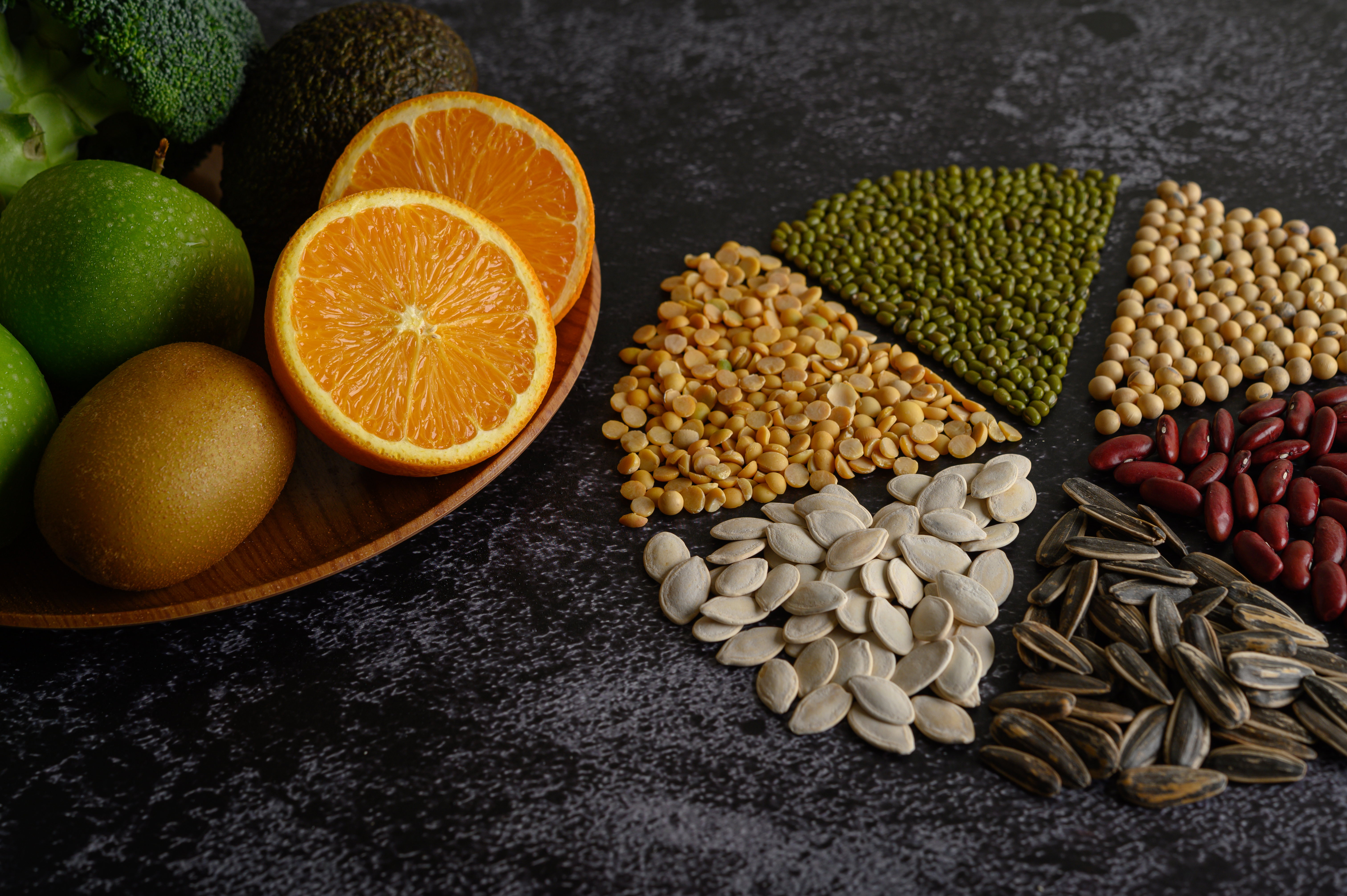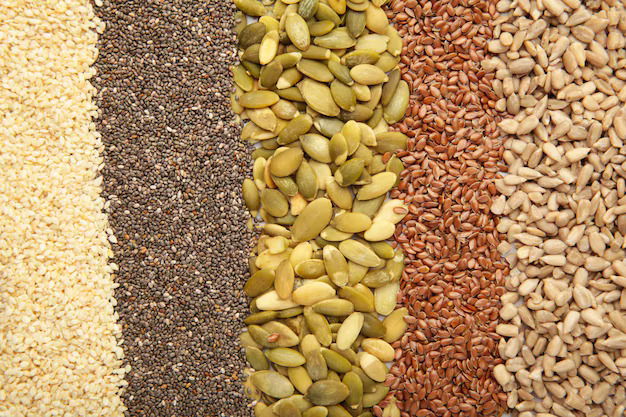7 Edible Seeds To Lower Bad Cholesterol Levels
Cholesterol—it’s a word we hear frequently in discussions about health, diet, and lifestyle. While cholesterol plays an essential role in the body, high levels of LDL (low-density lipoprotein), commonly known as “bad cholesterol,” can increase the risk of heart disease and stroke. Thankfully, dietary changes can be powerful in managing cholesterol levels.
One surprising yet incredibly effective dietary solution? Edible seeds. These tiny nutritional powerhouses are rich in fiber, healthy fats, plant sterols, and antioxidants—all of which contribute to lowering LDL cholesterol and supporting heart health.
In this blog post, we’ll dive deep into 7 edible seeds that can naturally help reduce bad cholesterol levels, explore the science behind their benefits, and provide practical tips on how to incorporate them into your daily diet.

Why Lowering Bad Cholesterol Matters
Before we get into the seeds themselves, it’s essential to understand why lowering bad cholesterol is important.
LDL cholesterol can build up on the walls of your blood vessels, forming plaque that narrows or blocks the arteries. This process, known as atherosclerosis, can lead to heart attacks, stroke, and peripheral artery disease.
On the other hand, HDL (high-density lipoprotein) cholesterol helps remove LDL cholesterol from the bloodstream. So, the goal is to reduce LDL while maintaining or increasing HDL levels.
Dietary modifications—particularly reducing trans fats, avoiding refined carbs, and increasing intake of heart-healthy nutrients—play a crucial role in this process. This is where seeds come into play.
The Power of Seeds in Cholesterol Management
Edible seeds offer a unique combination of:
- Soluble fiber – helps bind cholesterol in the digestive system.
- Healthy fats – especially omega-3 and omega-6 fatty acids.
- Plant sterols and stanols – which block cholesterol absorption.
- Antioxidants – reduce inflammation and oxidative stress.
Now let’s explore 7 scientifically-backed seeds that support lower cholesterol levels.
Flaxseeds – The Omega-3 Superstar
Why It Works:
Flaxseeds are rich in alpha-linolenic acid (ALA), a plant-based omega-3 fatty acid known for its heart-protective effects. They’re also a great source of soluble fiber and lignans, which have antioxidant and cholesterol-lowering properties.
Studies have shown that consuming flaxseeds can lower LDL cholesterol by up to 10-15% in individuals with high cholesterol.
How to Use:
- Add ground flaxseeds to smoothies, oatmeal, or yogurt.
- Use flaxseed meal in baking (pancakes, muffins, bread).
- Mix with water to use as an egg substitute in vegan recipes.
Note: Whole flaxseeds pass through the digestive tract largely undigested. For best results, consume ground flaxseeds.
Chia Seeds – Fiber-Rich Heart Helpers
Why It Works:
Chia seeds pack 10 grams of fiber per ounce, most of which is soluble fiber—a key player in reducing LDL cholesterol by trapping it in the digestive tract. They also contain ALA and various antioxidants.
When mixed with liquid, chia seeds form a gel-like substance, which helps slow digestion and lower blood sugar and cholesterol spikes after meals.
How to Use:
- Make chia pudding with plant-based milk and fruit.
- Sprinkle over salads or cereals.
- Blend into smoothies or use in baked goods.
Tip: Start with small portions and increase gradually to allow your digestive system to adjust to the high fiber content.
Sunflower Seeds – Phytosterol Powerhouses
Why It Works:
Sunflower seeds are high in phytosterols, plant compounds that block the absorption of cholesterol in the intestines. They’re also rich in unsaturated fats, vitamin E, and magnesium, all of which support heart health.
Consuming foods rich in phytosterols has been associated with a 10% or more reduction in LDL cholesterol.
How to Use:
- Snack on roasted (unsalted) sunflower seeds.
- Add to salads, granola, or trail mix.
- Blend into sunflower seed butter as a peanut butter alternative.
Caution: Choose unsalted varieties to avoid excess sodium, which can contribute to high blood pressure.
Pumpkin Seeds (Pepitas) – Zinc and Heart Health
Why It Works:
Pumpkin seeds contain phytosterols, omega-6 fatty acids, magnesium, and zinc. Zinc is essential for lipid metabolism and maintaining healthy blood vessels.
A study published in the Journal of Medicinal Food found that pumpkin seed oil supplementation resulted in a significant reduction in LDL cholesterol and an increase in HDL cholesterol in postmenopausal women.
How to Use:
- Sprinkle roasted pumpkin seeds over soups, salads, or oatmeal.
- Mix into homemade energy bars or granola.
- Blend into sauces or dips for a nutty flavor.
Sesame Seeds – Ancient Remedy with Modern Proof
Why It Works:
Sesame seeds are rich in sesamin and sesamolin, two unique antioxidants known to lower cholesterol and improve liver function. They also contain plant sterols, which are known to inhibit cholesterol absorption.
Research indicates that regular sesame seed consumption may reduce total cholesterol and LDL cholesterol while increasing antioxidant levels in the body.
How to Use:
- Sprinkle toasted sesame seeds on vegetables or salads.
- Use tahini (sesame paste) in dressings, hummus, or sauces.
- Add to stir-fry dishes or sushi for flavor and texture.
Pro Tip: Lightly toasting sesame seeds enhances flavor and nutrient absorption.
Hemp Seeds – Protein and Omega Balance
Why It Works:
Hemp seeds contain an ideal omega-6 to omega-3 ratio, which supports heart health and reduces inflammation. They’re also rich in plant-based protein, fiber, and arginine, an amino acid that promotes healthy blood vessel function.
Research on arginine has shown that it can help reduce blood pressure and improve cholesterol profiles, especially when combined with omega-3 fatty acids.
How to Use:
- Add to smoothies or yogurt.
- Sprinkle on avocado toast or roasted vegetables.
- Blend into protein shakes or plant-based protein bars.
Bonus: Hemp seeds are soft, nutty, and require no grinding—ready to use straight from the bag.
Psyllium Seeds (and Husk) – Fiber Hero
Why It Works:
Psyllium is technically a seed husk, but it earns a place on this list for its exceptional soluble fiber content. Just a small daily dose (5-10 grams) can significantly reduce LDL cholesterol levels, according to numerous studies.
Psyllium forms a viscous gel in the gut, trapping bile acids and excreting them. In response, the liver uses more cholesterol to produce new bile acids, effectively reducing LDL in the bloodstream.
How to Use:
- Mix psyllium husk with water or juice and drink immediately.
- Add to smoothies or sprinkle over cereal.
- Use in baking to add bulk and fiber.
Note: Drink plenty of water when consuming psyllium to avoid digestive discomfort.
How to Incorporate These Seeds Into Your Diet
Incorporating seeds into your diet is simple and doesn’t require major lifestyle changes. Here are some practical tips:
- Start your day with oatmeal or a smoothie topped with flax, chia, or hemp seeds.
- Snack smarter by replacing chips with roasted sunflower or pumpkin seeds.
- Bake with purpose by adding ground seeds into muffins, breads, or pancakes.
- Create seed mixes with various types to keep things exciting.
- Use seed-based spreads like tahini or sunflower seed butter on toast.

Additional Lifestyle Tips to Lower Cholesterol
While seeds are powerful, they work best as part of a comprehensive lifestyle approach. Here are a few additional tips:
- Exercise regularly – Aim for at least 150 minutes of moderate activity per week.
- Limit saturated fats – Avoid fried foods, processed meats, and full-fat dairy.
- Quit smoking – Smoking lowers good HDL cholesterol and damages arteries.
- Manage stress – Chronic stress can negatively affect cholesterol and heart health.
- Stay hydrated – Water supports metabolic functions and digestion.
Final Thoughts
When it comes to heart health and lowering bad cholesterol, nature offers some of the best tools available—and edible seeds are among the most potent.
From the omega-3 richness of flax and chia to the phytosterol strength of sunflower and pumpkin seeds, these small yet mighty foods can make a big difference in your health.
Incorporate these 7 edible seeds into your daily routine and experience not only better cholesterol levels but also increased energy, better digestion, and improved overall wellness. Remember, small seeds can lead to big changes—one spoonful at a time.
References
https://academic.oup.com/jn/article/142/8/1576/4630735
https://www.ncbi.nlm.nih.gov/pmc/articles/PMC6222990/
https://www.liebertpub.com/doi/10.1089/jmf.2007.676
https://nutritionandmetabolism.biomedcentral.com/articles/10.1186/1743-7075-7-32
https://academic.oup.com/ajcn/article/71/6/1433/4729349
.